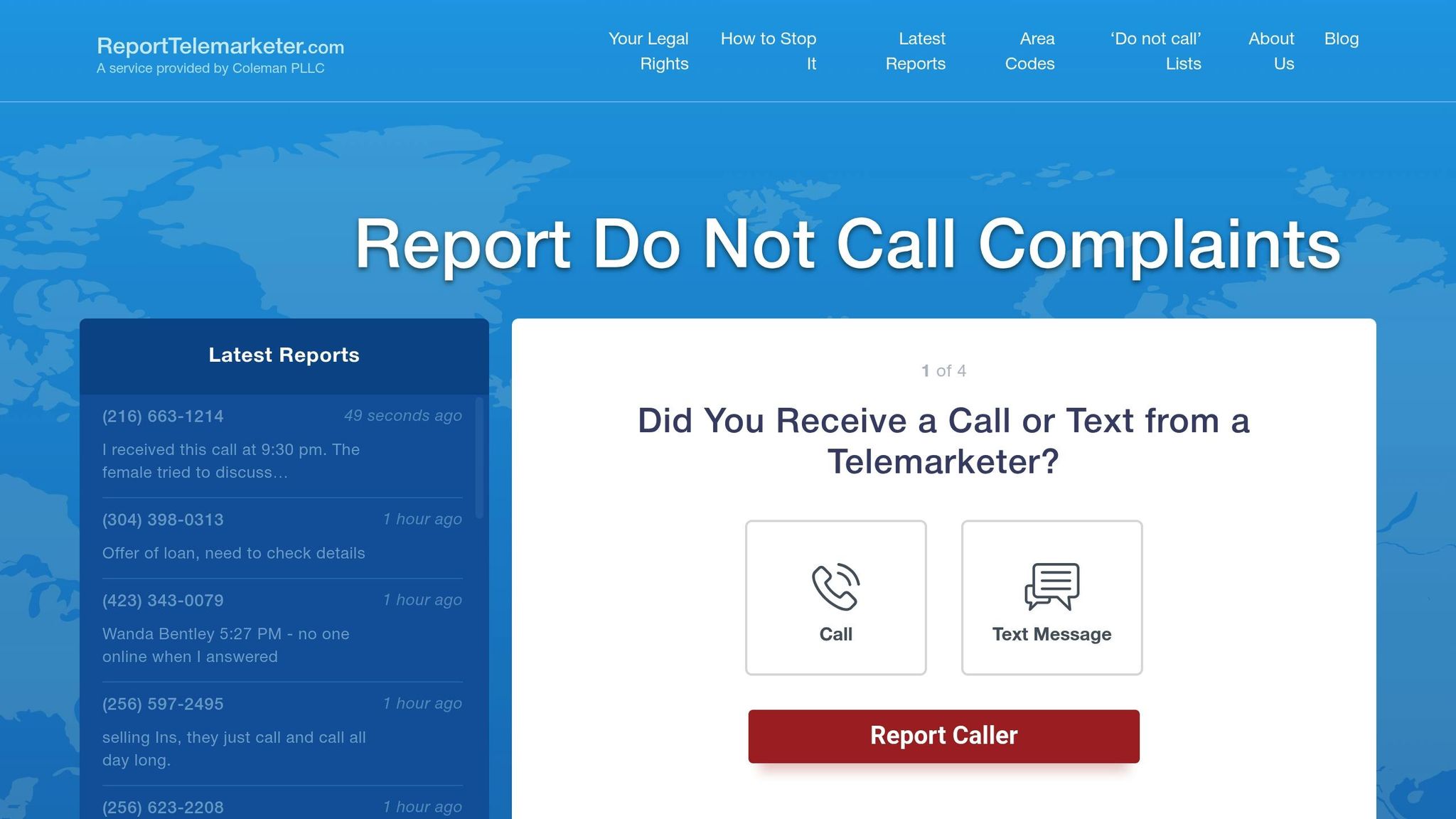
Telemarketing rules are strict, and understanding them can save you from unwanted calls and texts. Here’s what you need to know:
- Consent is Key: Businesses must get prior express written consent before contacting you with marketing calls, texts, or faxes.
- Revoking Consent: You can revoke consent anytime by replying "STOP", calling, or emailing. Starting April 11, 2025, companies must process opt-out requests within 10 business days.
- Bundled Consent is Banned: A single agreement cannot authorize multiple companies to contact you. Each business must get individual consent.
- Penalties for Violations: Companies ignoring these rules can face fines of $500–$1,500 per violation.
If you’re dealing with unwanted calls, platforms like ReportTelemarketer.com can help you take action, potentially earning compensation while stopping the harassment.
How to Prepare for the April 2025 TCPA Consent Revocation Order | Convoso
Key Components of FCC Consent Rules
The FCC has established clear consent rules to ensure businesses maintain high standards when contacting consumers. These rules emphasize protecting your privacy while still allowing businesses to connect with interested customers. By understanding these guidelines, you can better identify when companies are following proper procedures – or when they might be cutting corners.
What is ‘Prior Express Written Consent’?
At the heart of consumer privacy protection is the concept of prior express written consent. Under the Telephone Consumer Protection Act (TCPA), this consent must be explicit, written (including electronic formats), and cannot rely on verbal or implied agreements. It should clearly outline your agreement to receive marketing communications and specify the business seeking permission. The consent must be easy to spot and not buried in fine print.
For example, a proper consent form might say:
"By signing below, I agree to receive marketing calls and texts from [Company Name] at the number provided, using an autodialer or prerecorded voice."
On the other hand, a non-compliant form might use a single checkbox to authorize contact from multiple, unrelated companies.
You can give valid consent by checking a box online, signing a digital pad, or responding to an email – as long as the agreement is clear, specific, and directly tied to the business requesting permission.
How to Revoke Consent: Consumer Rights
If you’ve given consent, you can revoke it at any time. Whether by replying "STOP", calling customer service, or sending an email, your request must be honored. Starting April 11, 2025, businesses are required to process revocation requests through any reasonable method within 10 business days. They are allowed to send a single confirmation text within five minutes to verify your opt-out, but this message cannot include any marketing content.
If a business ignores your opt-out request, it could face penalties ranging from $500 to $1,500 per violation.
Prohibited Practices: Lead Generation and Bundled Consent
The FCC explicitly prohibits "bundled consent", where a single agreement allows multiple businesses to contact you. For instance, lead generation companies cannot obtain blanket permission for a list of sellers. Instead, each business must secure its own brand-specific consent. This rule ensures that agreeing to hear from one company doesn’t inadvertently open the door to unsolicited communications from others.
Although the Eleventh Circuit Court vacated the FCC’s "one-to-one consent" rule in January 2025 – which required separate consent for each seller – businesses must still follow general prior express written consent rules. The focus remains on transparent and specific agreements that outline exactly what types of communications you’re agreeing to receive and from whom.
Compliance Requirements for Telemarketers
To safeguard consumers, telemarketers must strictly follow the updated FCC guidelines. Non-compliance could result in penalties reaching up to $1,500 per violation. Implementing strong systems and comprehensive training is essential to meet these requirements.
Steps for Compliance
Telemarketers should reassess and update their consent and revocation practices to align with the latest FCC standards. This involves auditing existing procedures and making necessary adjustments.
Clear Consent Forms. Consent forms must explicitly identify the company contacting the consumer and outline the types of communications they will receive. Blanket consent covering multiple sellers is not permitted – each seller must secure separate, prior express written consent.
Staff Training. Employees need thorough training on valid consent practices, the prohibition against bundled consent, and the correct handling of revocation requests.
Database Reviews. Regular audits of lead databases are crucial. Telemarketers must ensure all entries include valid, individual written consent. Leads obtained through bundled consent or lacking proper documentation should be promptly removed.
Efficient Revocation Systems. Provide consumers with straightforward options to revoke consent, such as replying "STOP", using automated opt-out tools, or submitting online requests. These requests must be processed within 10 business days, after which no further calls or texts are allowed.
Technology Integration. Automate consent management processes and maintain detailed records to address disputes effectively.
Failing to implement these measures can lead to severe consequences.
Penalties for Non-Compliance
Violating these regulations exposes telemarketers to significant financial and reputational risks. Statutory damages range from $500 to $1,500 per violation, and since each violation is counted individually, a single campaign without proper consent can result in massive penalties.
Common mistakes – like outdated consent forms that fail to specify individual sellers, delays in honoring revocation requests, or purchasing leads without verified consent – can trigger these penalties. Additionally, under the Telephone Consumer Protection Act (TCPA), consumers have the right to sue telemarketers directly, even without proving actual harm.
"You May Recover $500 Per Call" – ReportTelemarketer.com
Beyond financial losses, non-compliance can tarnish a company’s reputation and invite regulatory scrutiny. The FCC’s increased enforcement highlights the importance of staying updated on regulatory changes.
For instance, the January 2025 decision overturning the "one-to-one consent" rule demonstrates how quickly legal requirements can shift. To avoid these pitfalls, telemarketers should conduct regular compliance audits, seek legal advice, and leverage advanced technology to manage consents and revocations effectively.
sbb-itb-a8d93e1
How to Report Telemarketing Violations
If you’re tired of dealing with telemarketers who ignore FCC consent rules, there’s a way to fight back and put an end to those annoying calls. The key is knowing how to document these violations and where to report them effectively. One solution is ReportTelemarketer.com, a platform designed to simplify the reporting process and take action on your behalf.
Using ReportTelemarketer.com

ReportTelemarketer.com has already helped over 30,000 people take action against illegal telemarketing practices. Operated by the consumer protection law firm Coleman, PLLC, this platform handles everything for you – and it’s completely free.
Step 1: Submit Your Report
Start by providing a detailed account of the unwanted call or text. Include the telemarketer’s phone number, the content of their messages, the dates and times they contacted you, and any evidence that you had previously revoked consent. This information is critical for building a case.
Step 2: Professional Investigation
Once your report is submitted, the platform’s team uses advanced tools to identify the telemarketer behind the calls. They verify whether the telemarketer violated FCC consent rules and may reach out to you for additional details. Investigations typically begin within just a few days.
Step 3: Legal Action
If the investigation confirms a violation, ReportTelemarketer.com takes swift action. This includes sending cease and desist letters or filing formal complaints to stop the calls. In some cases, they may even pursue legal action to recover damages.
"As a consumer protection firm, we use the telephone consumer protection laws to stop telemarketers from harassing consumers." – ReportTelemarketer.com
The service operates on a contingency basis, meaning you won’t pay anything upfront. Attorney fees are recovered from telemarketers only after a successful outcome.
Benefits of Reporting Telemarketing Violations
Stopping unwanted calls is just one benefit of reporting violations. By using ReportTelemarketer.com, you also contribute to broader enforcement efforts and hold violators accountable. Here’s why this platform stands out compared to filing complaints directly with agencies like the FCC or FTC:
Financial Compensation
Under the TCPA, you may be entitled to statutory damages for each violation – even if you didn’t suffer any harm. Since each call or text counts as a separate violation, damages can add up quickly for repeat offenders.
Quick Action
Unlike regulatory complaints, which can take time to process, ReportTelemarketer.com acts quickly. Cease and desist letters are often sent within weeks, leading to a noticeable decrease in unwanted calls.
Expert Legal Support
The platform’s team specializes in FCC consent rules, ensuring every case is thoroughly documented and pursued using the best legal strategies.
Privacy Safeguards
Your personal information is kept confidential throughout the process.
Broader Impact
Each report helps build a database of known violators, making it easier to identify repeat offenders and strengthen enforcement efforts against illegal telemarketing.
Conclusion
The FCC’s telemarketing consent rules give you the power to safeguard your privacy while holding violators accountable. This system not only shields consumers from intrusive practices but also helps maintain the integrity of businesses that follow the rules.
The numbers speak volumes – over 5 million robocall complaints were filed with the FCC in 2023 alone. These figures highlight the pressing need for compliance, as enforcement agencies and consumer protection services actively crack down on offenders.
For those dealing with relentless telemarketing violations, ReportTelemarketer.com provides a straightforward solution. Their platform offers professional investigation and legal assistance with no upfront costs, making it easier for consumers to take action.
FAQs
How can I revoke my consent to receive telemarketing calls or texts?
If you want to stop receiving telemarketing calls or texts, the first step is to let the telemarketer know directly. You can do this either by telling them verbally or by sending a written request. Make sure to document your request – note the date and time – for your own records.
If the calls keep coming after you’ve made it clear you want them to stop, you can escalate the issue by reporting it to consumer protection agencies. Be ready to share details like the caller’s name, phone number, and any messages you’ve received. This information can help authorities investigate and put an end to the unwanted communications.
What does the FCC’s rule against bundled consent mean for consumers who previously agreed to receive messages from multiple companies?
The FCC’s rule against bundled consent protects consumers by ensuring they aren’t compelled to accept telemarketing messages from several companies just to do business with one. In simple terms, businesses must now get separate and explicit consent for each company they want to send messages on behalf of, giving individuals more say over who can contact them.
If you’ve previously agreed to receive communications from multiple companies, this regulation allows you to reassess and withdraw consent for specific companies without impacting your agreements with others. Receiving unwanted calls or texts? You can report these violations to help put an end to them.
What can I do if a telemarketer keeps contacting me after I’ve revoked my consent?
If a telemarketer keeps reaching out to you after you’ve made it clear you no longer wish to be contacted, you have options to address the situation. You can report these unwanted calls or texts to consumer protection agencies that handle violations of telemarketing laws. These organizations may take steps like issuing cease-and-desist letters or filing formal complaints on your behalf to put an end to the harassment.
Under FCC regulations, telemarketers are legally obligated to respect your request to stop communication. If they ignore this, you may have legal grounds to take further action and safeguard your rights.